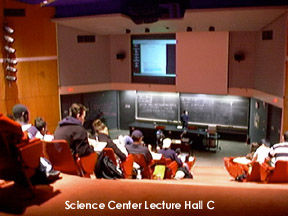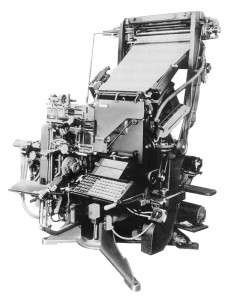GoTo, Gas Pedals, & Google: What Students Should Know, and Why That’s Not What We Teach Them
 In the 1980s I began teaching a course in BASIC programming in the Harvard University Extension, part of an evening Certificate of Advanced Study program for working students trying to get ahead. Much to my surprise, students immediately filled the small assigned lecture hall to overflowing, and nearly overwhelmed my lone teaching assistant.
In the 1980s I began teaching a course in BASIC programming in the Harvard University Extension, part of an evening Certificate of Advanced Study program for working students trying to get ahead. Much to my surprise, students immediately filled the small assigned lecture hall to overflowing, and nearly overwhelmed my lone teaching assistant.
Within two years, the course had grown to 250+ students. They spread throughout the second-largest room in the Harvard Science Center (Lecture Hall C– the one with the orange seats, for those of you who have been there). I now had a dozen TAs, so I was in effect not only teaching the BASIC course, but also leading a seminar on the pedagogical challenge of teaching non-technical students how to write structured programs in a language that heretically allowed “GoTo” statements.
Computer Literacy?
There’s nothing very interesting or exciting about learning to program in BASIC. Although I flatter myself a good teacher, even my best efforts to render the material engaging – for example, assignments that variously involved having students act out various roles in Stuart Madnick’s deceptively simple Little Man Computer system, automating Shirley Ellis‘s song The Name Game, and modeling a defined-benefit pension system – in no way explained the course’s popularity.
So what was going on? I asked students why they were taking my course. Most often, they said something about “computer literacy”. That’s a useful (if linguistically confused) term, but in this case a misleading one.
If the computer becomes important, the analogy seems to run, then the ability to use a computer becomes important, much as the spread of printed material made reading and writing important. So far so good. For the typical 1980s employee, however, using computers in business and education centered on applications like word processors, spreadsheets, charts, and maybe statistical packages. Except for those within the computer industry, it rarely involved writing code in high-level languages.
 BASIC programming thus had little direct relevance to the “computer literacy” students actually needed. The print era made reading and writing important for the average worker and citizen. But only printers needed adeptness with the technologies of paper, ink, composition (in the Linotype sense), and presses. That’s why the analogy fails: programming, by the 1980s, was about making computer applications, not using them. That’s the opposite of what students actually needed.
BASIC programming thus had little direct relevance to the “computer literacy” students actually needed. The print era made reading and writing important for the average worker and citizen. But only printers needed adeptness with the technologies of paper, ink, composition (in the Linotype sense), and presses. That’s why the analogy fails: programming, by the 1980s, was about making computer applications, not using them. That’s the opposite of what students actually needed.
Yet clearly students viewed the ability to program in BASIC – even “Shirley Shirley bo-birley…” – as somehow relevant to the evolving challenges of their jobs. If BASIC programming wasn’t directly relevant to actual computer literacy, why did they believe this? Two explanations of its indirect importance suggest themselves:
- Perhaps ability to program was an accessible indicator of more relevant yet harder-to-measure competence. Employers might have been using programming ability, however irrelevant directly, as a shortcut measure to evaluate and sort job applicants or promotion candidates. (This is essentially a recasting of Lester Thurow‘s “job queues” theory about the relationship between educational attainment and hiring, namely that educational attainment signals the ability to learn quickly rather than provides direct training.) Applicants or employees who believed this was happening would thus perceive programming ability as a way to make themselves appear attractive, even though the skill was actually irrelevant.
- Perhaps students learned to program simply to gain confidence that they could cope with the computer age.
I propose a third explanation:
- As technology evolves, generations that experience the evolution tend to believe it important for the next generation to understand what came before, and advise students accordingly.
That is, we who experience technological change believe that competence with current technology benefits from understanding prior technology – a technological variant of George Santayana’s aphorism “Those who cannot remember the past are condemned to repeat it” – and send myriad direct and indirect messages to our successors and students that without historical understanding one cannot be fully competent.
Shifting Gears
 My father taught me to drive on the family’s 1955 Chevy station wagon, a six-cylinder car with a three-speed, non-synchromesh, stalk-mounted-shifter manual transmission and power nothing. After a few rough sessions learning to get the car moving without bucking and stalling, to turn and shift at the same time, and to double-clutch and downshift while going downhill, I became a pretty good driver.
My father taught me to drive on the family’s 1955 Chevy station wagon, a six-cylinder car with a three-speed, non-synchromesh, stalk-mounted-shifter manual transmission and power nothing. After a few rough sessions learning to get the car moving without bucking and stalling, to turn and shift at the same time, and to double-clutch and downshift while going downhill, I became a pretty good driver.
But my father, who had learned to drive on a Model T Ford with a planetary transmission and separate throttle and spark-advance controls, remained skeptical of my ability. He was always convinced that since I didn’t understand that latter distinction, I really wasn’t operating the car as well as I might. (Today’s “accelerator”, if I understand it correctly, combines the two functions: it tells the engine to spin faster, which is what the spark-advance lever did, and then feeds it the necessary fuel mixture, which was the throttle’s function.)
Years later it came time for our son’s first driving lesson. We were in our automatic-transmission Toyota Camry, equipped with power steering and brakes, on a not-yet-opened Cape Cod subdivision’s newly paved streets. Apparently forgetting how irrelevant the throttle/spark distinction had been to my learning to drive, I delivered a lecture on what was going on in the automatic transmission – why it didn’t need a clutch, how it was deciding when to shift gears, and so forth. Our son listened patiently, and then rapidly learned to drive the Camry very well without any regard to what I’d explained. My lecture had absolutely no effect on his competence (at least not until several years later, I like to believe, when he taught himself to drive a friend’s four-in-the-floor VW).
Technological Instruction
Which brings me to the present, and the challenge of preparing today’s students for tomorrow’s technological workplaces. What should be our advice to them be, either explicitly – in the form of direct instruction or requirements – or implicitly, in the form of contextual guidance such as induced so many students to take my BASIC course? In particular, how can we break away from the generational tendency to emphasize how we got here rather than where we’re going?
I don’t propose to answer that question fully here, but rather to sketch, though two examples, how a future-oriented perspective might differ from a generational one. The first example is cloud services, and the second example is online information.
Cloud Services
I started writing this essay on my DC office computer. I’m typing these words on an old laptop I keep in my DC apartment, and I’ll probably finish it on my traveling computer or perhaps on my Chicago home computer. A big problem ensues: How do I keep these various copies synchronized? My answer is a service called Dropbox, which copies documents I save to its central servers and then disseminates them automatically to all my other computers and even my phone. What I need is to have the same document up to date wherever I’m working. Dropbox achieves this by synchronizing multiple copies of the same documents across multiple computers and other devices.
Alternatively, I might gotten what I need– having the same document up to date wherever I’m working– by drafting this post as a Google or Live document. Rather than editing different synchronized copies of the document, I’d actually have been editing the same remote document from different computers rather than synchronizing local copies among those computers.
My instincts are that this difference between synchronized and remote documents is important, something that I, as an educator, should be sure the next generation understands. When my son asks about how to work across different machines, my inclination is to explain the difference between the options, how one is giving way to the other, and so forth. Is that valid, or is this the same generational fallacy that led my father to explain throttles and spark advance or me to explain clutches and shifting?
Online Information
When I came to the history quote above, I couldn’t remember its precise wording or who wrote it. That’s what the Internet is for, right? Finding information?
 I typed “those who ignore the past are doomed”, which was the partial phrase I remembered, into Google’s search box. Among the first page of hits, the first time I tried this, were links to answers.com, wikiquote.org, answers.google.com, wikipedia.org, and www.nku.edu. The first four of those pointed me to the correct quote, usually giving the specific source including edition and page. The last, from a departmental web page at Northern Kentucky University, blithely repeated the incorrect quote (but at least ascribed it to Santayana). One of the sources (answers.com) pointed to an earlier, similar quote from Edmund Burke. The Wikipedia entry reminded me that the quote is often incorrectly ascribed to Plato.
I typed “those who ignore the past are doomed”, which was the partial phrase I remembered, into Google’s search box. Among the first page of hits, the first time I tried this, were links to answers.com, wikiquote.org, answers.google.com, wikipedia.org, and www.nku.edu. The first four of those pointed me to the correct quote, usually giving the specific source including edition and page. The last, from a departmental web page at Northern Kentucky University, blithely repeated the incorrect quote (but at least ascribed it to Santayana). One of the sources (answers.com) pointed to an earlier, similar quote from Edmund Burke. The Wikipedia entry reminded me that the quote is often incorrectly ascribed to Plato.
 I then typed the same search into Bing’s search box. Many links on its first page of results were the same as Google’s — answers.com and wikiquotes — but there were more links to political comments (most of them embodying incorrect variations on the quote), and one link to a conspiracy-theorist page linking the Santayana quote to George Orwell’s “He who controls the present, controls the past. He who controls the past, controls the future”.
I then typed the same search into Bing’s search box. Many links on its first page of results were the same as Google’s — answers.com and wikiquotes — but there were more links to political comments (most of them embodying incorrect variations on the quote), and one link to a conspiracy-theorist page linking the Santayana quote to George Orwell’s “He who controls the present, controls the past. He who controls the past, controls the future”.
It wasn’t hard for me to figure out which search results to heed and which to ignore. The ability to screen search results and then either to choose which to trust or to refine the search is central to success in today’s networked world. What’s the best way to inculcate that skill in those who will need it?
 I’ve been working in IT since before the Digital Equipment Corporation‘s Altavista, in its original incarnation, became the first Web search engine. The methods different search services use to locate and rank information have always been especially interesting. The early Altavista ranked pages based on how many times search words appeared in them – a method so obviously manipulable (especially by sneaking keywords into non-displayed parts of Web pages) that it rapidly gave way to more robust approaches. The links one gets from Google or Bing today come partly from some very sophisticated ranking said to be based partly on user behavior (such as whether a search seems to have succeeded) and partly on links among sites (this was Google’s original innovation, called PageRank) – but also, quite openly and separately, from advertisers paying to have their sites displayed when users search for particular terms.
I’ve been working in IT since before the Digital Equipment Corporation‘s Altavista, in its original incarnation, became the first Web search engine. The methods different search services use to locate and rank information have always been especially interesting. The early Altavista ranked pages based on how many times search words appeared in them – a method so obviously manipulable (especially by sneaking keywords into non-displayed parts of Web pages) that it rapidly gave way to more robust approaches. The links one gets from Google or Bing today come partly from some very sophisticated ranking said to be based partly on user behavior (such as whether a search seems to have succeeded) and partly on links among sites (this was Google’s original innovation, called PageRank) – but also, quite openly and separately, from advertisers paying to have their sites displayed when users search for particular terms.
Here again the generational issue arises. Obviously we want to teach future generations how to search effectively, and how to evaluate the quality and reliability of the information their searches yield. But do we do this by explaining the evolution of search and ranking algorithms – the generational approach based on the preceding paragraph – or by teaching more generally, as bibliographic instructors in libraries have long done, how to cross-reference, assess, and evaluate information whatever its form?
Understanding throttles and spark advance did not help me become a better driver, understanding BASIC probably didn’t help prepare my Harvard students for their future workplaces, and explaining diverse cloud mechanisms and search algorithms isn’t the best way for us to maximize our students’ technological competence. Much as I love explaining things, I think the essence of successful technological teaching is to focus on the future, on the application and consequences of technology rather than its origins.
That doesn’t mean that we should eschew the importance of history, but rather than history does not suffice as a basis for technological instruction. It’s easier to explain the past than to anticipate the future, but that last, however risky and uncertain and detached from our personal histories, is our job.